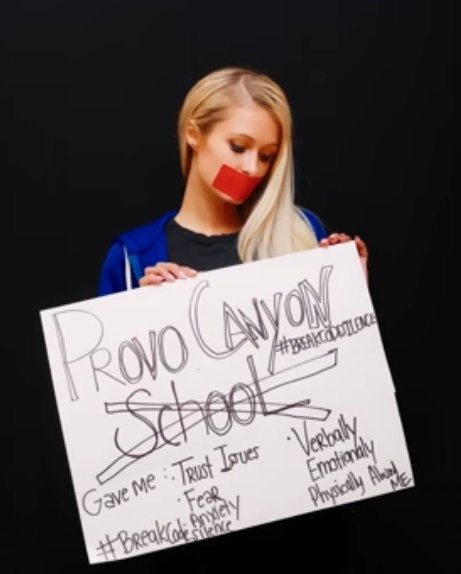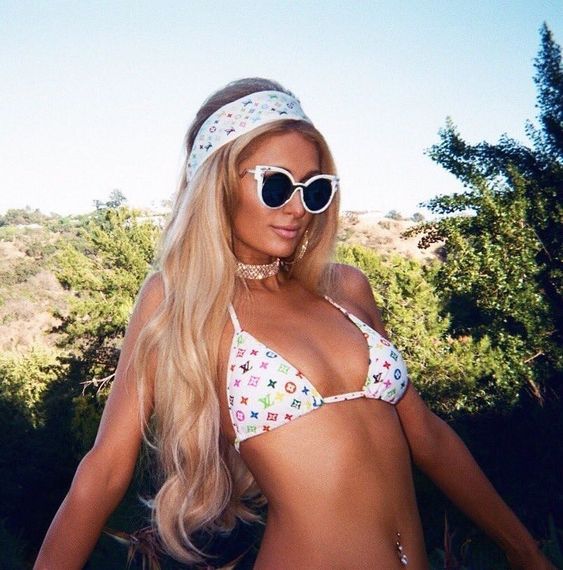If you’ve been on social media in any way, shape or form in the last 14 days, you probably know that Paris Hilton released a documentary about her life and her struggles in the limelight, which you can watch for free on Youtube here:
“This is Paris” made its YouTube debut on September 13 with very little promotion beforehand other than a teaser trailer released on August 17. The hour and 45-minute documentary, which has surpassed nearly 12 million views, is very intimate and is the closest thing anyone could get to truly understanding a day in Paris’ life. It is nothing like the early 2000’s film “Paris, Not France”, which largely discussed Paris’ influence on party and pop cultures, as well as many other It Girls at the time.
The very personal, open, honest movie was an eye-opening glimpse at what it really means to be Paris Hilton. With interviews from her mother and sister, home videos from her childhood, behind-the-scenes footage from events, music festivals, and even moments from her own home about her life in the limelight. America’s most prominent heiress-turned-party girl-turned-business mogul is a lot more dimensional than the world ever gave her credit for, and that is obvious in this film.
Why is this important though? What does this have to do with anything? Why is the world still following Paris Hilton nearly 20 years after she arrived on the pop culture scene? Surprisingly, this isn’t just a “woe is me” movie describing the pressures of being under constant paparazzi watch as a young girl or the societal demand to be perfect all the time as a woman. Paris Hilton’s life was not as picture-perfect as all the tabloids made her seem, and not even in a girls-gone-wild way (not that either of those are invalid struggles). There is a truly disturbing part of Paris Hilton’s life that has been, up until this point, completely undocumented. This film is not just a documentation of the most followed heiress in America, but a story of resilience, drive, and finding ways to live your truth in a time where being yourself isn’t Instagram-able or share-worthy.

A Mogul, Made
Upon the release of “This is Paris”, Twitter was shocked to hear that the voice we all believed belonged to Paris was actually fake; her real voice is much deeper and less dependent on her vocal fry. This, of course, spawned memes and jokes and tweets about how it really wasn’t that big of a difference. However, Paris hasn’t just been hiding her real voice; she’s been hiding her real self for almost 20 years. There is an entire other Paris Hilton the world knew absolutely nothing about. She’s a tomboy, she’s quirky, she’s anxious, and she has serious trust issues. This documentary made her seem far more human than any reality show or business endeavor ever has.
Nicky Hilton, Paris’ sister, discloses that the persona Paris has celebritized is so completely opposite of who Paris actually is. Frankly, this only becomes more and more transparent throughout the progression of the film. As aforementioned, Paris created a voice to match the personality she created for the press. She made an entirely new person out of herself and closed off her real self from the rest of the world. Nobody ever really knew Paris, and that was completely intentional.
For years, people believed she was a dumb blonde with daddy’s credit card and a partying problem, but she is truly one of the most brilliant minds of her time; she branded herself 20 years ago and is still entirely relevant today, in more ways than one. Her success has come at a cost, though. Paris mentions throughout the documentary that she struggles with trust issues and letting people in. She was wildly popular, but nobody ever seemed to truly know Paris.

A Not-So Charmed Life
There are lots of home videos of Paris’ childhood at the beginning of the documentary, and it is blatantly obvious that this Paris and the one we have become accustomed to are two entirely different people. Paris’ mother, Kathy, and Nicky described Paris as a very shy tomboy growing up. Paris loved animals; so much so that her mother believed she would be a veterinarian. She owned a menagerie of exotic pets, such as monkeys, snakes, and ferrets as a child. Nicky says Paris was not as concerned with clothes or jewelry or makeup as she was growing up, and that she is truly a tomboy at her core. The Paris in these home videos is quirky, silly and free-spirited in a way that the media never saw.

After moving to New York City in 1996, Paris struggled with being the new girl in school. New York was a socialite scene, and Paris was a Hilton, but she didn’t fit in with that particular crowd. She was still the eclectic girl who preferred kittens over couture. Paris said she was bullied by a lot of the girls she went to school with, and that she felt isolated and alone. Her parents were very strict; she wasn’t allowed to go on dates or to school dances and was forced to take etiquette classes. Paris stated that her mother wanted her to be a Hilton, but Paris only ever wanted to be Paris.
Paris had finally had enough. To cope, Paris began partying and going out all night, every night. She called herself “addicted” to nightlife, saying she could be who she truly was and finally felt accepted. This is when Paris became obsessed with the media truly emerged. She was a teenager with a good fake I.D., going to bars and dancing on tables, getting into the most exclusive clubs in New York. Much to the dismay of her parents, this is where Paris “finally became Paris.”

Trouble in Paradise
As glamorous and exciting as Paris’ life may have seemed, the media personality is actually deeply troubled. Early in the movie, Paris admits she struggles with horrible insomnia and has nightmares nearly every night. Around halfway through the documentary, Paris remarks that she spent much of her adolescence at several Emotional Growth Schools – which are meant to heal troubled young people and spur emotional maturity – after her parents believed she had gotten out of control. At the first school, Paris was physically abused in front of the entire school by the counselors after trying to run away. It was at this point that she started what would be a long process of continually switching Emotional Growth Schools.
The last school she attended, the Provo Canyon School, was what Paris recounts as the most traumatic experience of her life. Paris recounted that she was forcibly removed from her bed in the middle of the night, screaming and crying for her parents, while they watched her be drug out of her own home. It was then that Paris was taken to Provo. Paris explains that while at the Provo School, she endured physical, verbal, and emotional abuse, was forced into solitary confinement, and was force-fed pills by the staff that she was not prescribed. After 11 months at Provo, Paris was finally allowed to return home to New York. She had not discussed the abuse she endured at the Provo Canyon School until the filming of “This is Paris”.

Now, nearly 20 years after leaving Provo, Paris is finally speaking out against her abusers. Toward the end of the film, Paris invites some of her best friends from her time at Provo to her home to discuss their time at the school and to create a plan to come forward. After reuniting with her best friends from the school, Paris and her fellow survivors are creating a movement to speak up against the abuse they faced and to prevent it from happening to others.
#BreakingCodeSilence is a movement dedicated to preventing and ending the abuse of troubled teens at school, and from monetizing struggling teenagers as an industry. After recording videos describing their time at Provo and their reasons for speaking out, Paris and her friends made posters describing the aftermath of their experiences at the school with #BreakingCodeSilence.
While Provo Canyon was not the only institution Paris attended, it is where she suffered the abuse that traumatizes her to this day. The documentary mentions that not only does Provo itself possess a wildly barbaric, remorseless environment, but many of its staff leave Provo to start their own schools with the same kinds of abuse. So, not only are children being abused at Provo, but hundreds of other kids are being abused nationwide by people with the same mindset and teachings. #BreakingCodeSilence is allowing victims to share their stories and find peace in knowing no child will have to suffer through what they have. Provo, its sister schools, and the hundreds of other abusive disciplinary schools have a long history of abuse; Paris Hilton is not going to allow that to go unscathed any longer.

“This is Paris”, and So Are We
If you’ve made it this far, you may have some questions. Why is Paris Hilton still a big name? How is this relevant to my life? What do I have in common with one of the wealthiest women in America? Honestly, a lot more than you might think. If you have ever hidden your true self, suffered abuse at the hand of another person, had difficulty opening up or letting people in, struggled in silence or simply felt you were never enough, you are more like Paris Hilton than you probably ever realized. While Paris was born with a privilege most will never know, her mental health suffered what feels to be irreparable damage. Years of being misunderstood and grappling with the pressure of life in the spotlight have left her anxious and afraid to show the world who she really is.
Paris says that one of the reasons she waited so long to come forward about her abuse at disciplinary school was the fear that it would ruin her image. In the 21st century, a young woman was nervous to discuss her abuse in a way that could possibly heal herself, others, and prevent it from happening to someone else, because as a society, we are uncomfortable with survivors discussing their abuse. Not only did Paris suffer, but she had to continue to do so with her trauma completely alone.

Paris choosing to speak up about her abuse as a teenager is a win for survivors of abuse everywhere. The entire documentary as a whole was honestly pretty brave of her. Admitting that you struggle with your mental health, exposing your abusers and truly showing yourself is intimidating as is, but on a global scale? To a world that as viewed you solely as an airhead? For your entire life? We all owe Miss Hilton for this.
By using her platform to help others, Paris is encouraging those who have experienced abuse to come forward and get the help they need. Shining a light on such a heavy topic is daunting and terrifying, but the relief and the peace that will come from Paris raising her voice against something that was wrong is something that will continue to reap benefits for years to come. Nobody should have to suffer in silence. Today, and everyday, we should all choose to be a little more like Paris Hilton.






